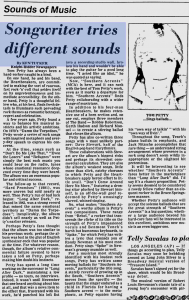Sounds of Music: Songwriter tries different sounds
By Ken Tucker
Beaver County Times - April 7, 1985
Tom Petty has always been a hard-rocker caught in a bind.
On one hand, he and his band, the Heartbreakers, are committed to making the sort of raucous, fast rock-'n'-roll that prides itself on its unpretentiousness and immediate accessibility. On the other hand, Petty is a thoughtful fellow who, at his best, finds fresh details to illuminate such pervading rock themes as romantic betrayal, regret and celebration.
A few years ago, Petty found a way to balance his musical instincts and his artistic ambitions. On 1979's "Damn the Torpedoes," Petty wrote a series of rock songs with inspired metaphors and every-day speech to express his concerns.
At the time, songs such as "Don't Do Me Like That," "Even the Losers" and "Refugees" were simply the best rock music you could hear on the radio, tunes whose emotional resonance deepened every time they were heard. The album was an enormous popular and critical success.
The follow-up to that record, "Hard Promises" (1981), was more uneven but sold nearly as well. Then Petty's run of bad luck began: "Long After Dark," released in 1982, was a strong record that mined the same emotional territory as "Damn the Torpedoes"; inexplicably, the album didn't sell nearly as well as Petty's earlier releases.
Perhaps Petty's fans thought that the album was too similar to his previous work; perhaps the album was lost in the glut of English synthesizer-rock that was popular at the time. For whatever reason, though, the album's relative commercial failure seemed to have taken a toll on Petty, perhaps making him doubt his instincts.
Petty has spent a long time working on the successor to "Long After Dark," maintaining a low profile -- no tours, no interviews. Indeed, it wasn't until November that one heard anything about him at all, and that was a news item to the effect that, frustrated with his work, he'd punched his left fist into a recording-studio wall, broken his hand and wouldn't be able to play the guitar for a good long time. "I acted like an idiot," he was quoted as saying.
Now, "Southern Accents" (MCA) is here, and it can rank with the best of Tom Petty's work, even as it marks a departure for him. "Southern Accents" finds Petty collaborating with a wider range of musicians.
In addition to his four-man Heartbreakers, he makes extensive use of a horn section and, on one cut, employs three members of The Band -- Robbie Robertson, Garth Hudson, and Richard Manuel -- to create a stirring ballad that closes the album.
Petty has also co-written three songs with an unlikely partner: Dave Stewart, half of the English pop band Eurythmics.
These collaborations with Stewart are the album's biggest risks and perhaps its shrewdest commercial calculation. They are also the album's weakest songs, little more than slick, catchy choruses to which Petty and the Heartbreakers apply heroic effort to little avail. "Don't Come Around Here No More," featuring a droning sitar plucked by Stewart himself, is an off-the-wall goof redeemed by Petty's amusingly slurred, whined singing.
No, what makes "Southern Accents" a worthy album is Petty's own compositions. These range from "Rebel," a rocker that transcends the cliche of its title on the strength of Petty's impassioned vocals and Benmont Tench's harsh but humorous keyboards, to "Spike," for which Petty has written a lyric that reminds you of Randy Newman at his most mordant. Petty sings "Spike" in Newman's grumpy mumble as well.
For a musician most strongly identified with his loudest rock songs, Petty has written some moving ballads for "Southern Accents," particularly the title song. A stately reverie of growing up in the South, "Southern Accents" moves from the specific -- the taunts that the singer endured as a child in Florida for having a Southern accent -- to the metaphoric, as Petty equates having his "own way of talkin'" with his "own way of livin'."
Throughout the song, Tench's piano builds in emphasis, and Jack Nitzsche accomplishes that rate thing -- an understated string arrangement whose presence in a rock song doesn't seem wildly inappropriate or the slightest bit pretentious.
It will be interesting to see whether "Southern Accents" fares better in the marketplace than "Long After Dark" did. I'd say it's a chancy proposition: Petty seems doomed to be considered a rowdy fellow rather than an eloquent rocker in the Bruce Springsteen manner.
Whether Petty's audience will accept the solemn ballads that are the greatest strength of "Southern Accents" is a big question: whether a large audience beyond his hard-core fans will be interested in this excellent, ambitious new music is an even bigger one.

